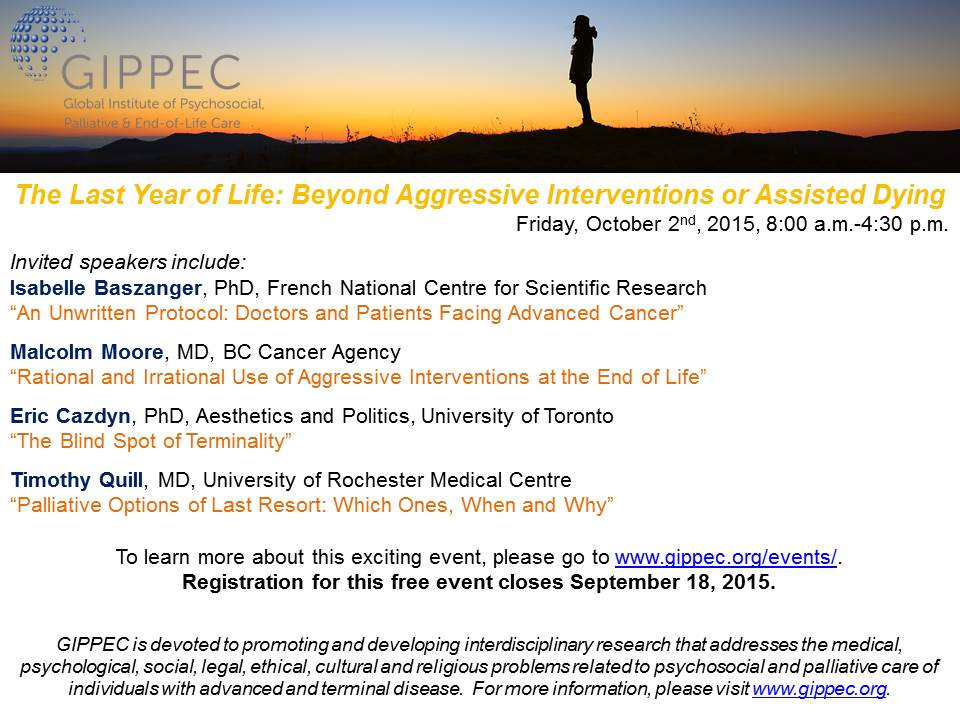
Gary Rodin is the Joint University of Toronto/University Health Network Harold and Shirley Lederman Chair in Psychosocial Oncology and Palliative Care and is Head of the Department of Supportive Care at the Princess Margaret Cancer Centre in Toronto.
Dr. Rodin is the Director of the Global Institute of Psychosocial, Palliative and End-of-Life Care (GIPPEC) and a Professor of Psychiatry at the University of Toronto. He is a clinician-investigator who has published widely on the psychiatric and psychosocial aspects of cancer and other medical illnesses. Under his leadership, the Department of Supportive Care at the Princess Margaret has now achieved an international reputation for its academic and clinical excellence.
Dr. Rodin has authored texts on Depression in the Medically Ill, and on the Psychiatric Aspects of Transplantation and is currently leading research on the psychological impact of advanced and terminal disease in affected patients and their families.
Camilla Zimmermann is Head of Palliative Care for the University Health Network and Medical Director of the Harold and Shirley Lederman Palliative Care Centre at Princess Margaret. She is also a Scientist at the Princess Margaret Cancer Centre, Associate Professor of Medicine at the University of Toronto, and holds the Rose Family Chair in Supportive Care in the Faculty of Medicine at the University of Toronto.
Dr. Zimmermann is internationally known for her research on palliative and supportive cancer care, has published widely in peer-reviewed journals, and is co-editor of the textbook Supportive Oncology. Her research on early palliative care in patients with solid tumours and leukemia is funded by the Canadian Cancer Society and the Canadian Institutes for Health Research.
She was awarded the William E. Rawls Prize by the Canadian Cancer Society for her research, which is focused on determining the best way to provide timely, integrated symptom management and supportive care for patients with cancer and their families.
Isabelle Baszanger is a sociologist and Senior Research Scientist Emerita at the National Centre for Scientific Research (CNRS). She works at Cermes3, Centre de Recherche Médecine, Sciences, Santé, Santé Mentale, Société, Paris, France.
The general theme of her research explores medical work at the limits of scientific and medical knowledge, therapeutic possibilities and the human condition (pain, suffering, the life-death boundary). In this work at the limits, new forms of clinical practice are invented , with new forms of collaboration among professionals and between them and patients, as well as new forms of medical management of incurability. In this process new subjectivities emerge.
These limits challenge some of the conventional concepts and tools that structure medical practice: objectivity, regulation of practices, cures, palliation and chronicity. It is also a point at which new relationships between medicine and society are developed.
In an earlier book (Inventing Pain Medicine. From the Laboratory to the Clinic) she explored how medicine has worked to push back the limits of pain through the development of medicine for pain. Her current research has focused on analyzing the transformation of the medical work made by an ever growing number of actors (including patients, who, it should be remembered, are also actors in medical work) when evidence-based medicine can no longer shape medical work and decision-making becomes more open. Her work aims at illuminating how doctors and patients cope with situations when the possibilities for therapeutic action are narrowing and the end of life is near,
Her work draws on a multi-sites ethnography of the everyday work of clinical oncologists and palliative physicians in highly specialized academic hospitals, and the historical analysis of the most recent evolution of chemotherapy and end-of-life management.
Malcolm Moore is the president of the BC Cancer Agency. Prior to this role Dr. Moore was head of the division of medical oncology and hematology at Princess Margaret Cancer Centre, where he was also a practicing oncologist focused on the treatment of pancreatic and other gastrointestinal cancers. He was the director of the McCain Pancreatic Cancer Centre at Princess Margaret and the president of the International Society of Gastrointestinal Oncology. Over the past two decades, he has also been involved in the development of new cancer therapies, and he has been a principal investigator in a number of practice-changing clinical studies. Dr. Moore has authored over 250 peer-reviewed publications and has given more than 200 invited lectures worldwide.
Eric Cazdyn is Distinguished Professor Aesthetics and Politics at the University of Toronto, where he teaches courses on critical and cultural theory, illness, psychoanalysis, radical politics, film, and modern Japan. He is the author of the following books: The Already Dead: The New Time of Politics, Culture, and Illness (Duke, 2012), Nothing: Three inquiries in Buddhism (with Marcus Boon and Timothy Morton, University of Chicago, 2015), After Globalization (with Imre Szeman, Wiley-Blackwell, 2011), The Flash of Capital (Duke, 2002); and editor of Trespasses (Duke, 2010) and Disastrous Consequences (SAQ, 2007).
Timothy E. Quill is a Professor of Medicine, Psychiatry, and Medical Humanities at the University of Rochester School of Medicine and Dentistry, and a Board certified palliative care consultant in Rochester, New York.
Dr. Quill has published and lectured widely about various aspects of the doctor-patient relationship, with special focus on end-of-life decision making, including delivering bad news, nonabandonment, discussing palliative care earlier, and exploring last-resort options. He is the author of several books on end-of life, including Physician-Assisted Dying: The Case for Palliative Care and Patient Choice (Johns Hopkins University Press, 2004), Caring for Patients at the End of Life: Facing an Uncertain Future Together (Oxford University Press, 2001), and A Midwife Through the Dying Process: Stories of Healing and Hard Choices at the End of Life (Johns Hopkins University Press, 1996), Palliative Care and Ethics (Oxford University Press, 2013) and numerous articles published in major medical journals including "Death and Dignity: A Case of Individualized Decision Making" published in the New England Journal of Medicine. Dr. Quill was the lead physician plaintiff in the New York State legal case challenging the law prohibiting physician-assisted death that was heard in 1997 by the U.S. Supreme Court (Quill v. Vacco).
|
8:00 a.m. |
REGISTRATION (LIGHT BREAKFAST SERVED) |
|
8:45 a.m. |
Welcome and Introduction Gary Rodin, MD, Head, Supportive Care, Princess Margaret Cancer Centre; Director, GIPPEC Jill Kelsall, Caregiver |
|
SESSION I: (9:00 a.m.-12:00 p.m.) |
Desperate Times: Treatment Decisions Near the End of Life Chair – Gary Rodin, MD, Head, Supportive Care, Princess Margaret Cancer Centre; Director, GIPPEC |
|
9:00 a.m. |
An Unwritten Protocol: Doctors and Patients Facing Advanced Cancer 2015 Jeremy A. Oliver Lecture in Palliative Care |
|
9:55 a.m. |
BREAK |
|
10:15 a.m. |
Rational and Irrational Use of Aggressive Interventions at the End of Life 2015 Jeremy A. Oliver Lecture in Palliative Care |
|
11:10 a.m. |
Panel Discussion Chair – Gary Rodin, MD, Head, Supportive Care, Princess Margaret Cancer Centre; Director, GIPPEC Invited Discussion Panel Isabelle Baszanger, PhD, Director, French National Centre for Scientific Research Malcolm Moore, MD, President, BC Cancer Agency Jennifer Gibson, PhD, Director, University of Toronto Joint Centre for Bioethics, University of Toronto Yona Lunsky, PhD, Director, Health Care Access Research and Developmental Disabilities, Centre for Addiction and Mental Health |
|
12:00 p.m. |
NETWORKING LUNCH |
|
SESSION II: (1:30 p.m. – 4:30 p.m.) |
Meaning and Personal Control at the End of Life Chair – Camilla Zimmermann, MD, PhD, Head, Palliative Care, Princess Margaret Cancer Centre; Vice Director, GIPPEC |
|
1:30 p.m. |
The Blind Spot of Terminality Eric Cazdyn, PhD, Distinguished Professor, Aesthetics and Politics, University of Toronto |
|
2:25 p.m. |
BREAK |
|
2:45 p.m. |
Palliative Options of Last Resort: Which Ones, When and Why Timothy Quill, MD, Distinguished Professor, Palliative Care, University of Rochester Medical Centre |
|
3:40 p.m. |
Panel Discussion Chair – Camilla Zimmermann, MD, PhD, Head, Palliative Care, Princess Margaret Cancer Centre; Vice Director, GIPPEC Invited Discussion Panel Eric Cazdyn, PhD, Distinguished Professor, Aesthetics and Politics, University of Toronto Timothy Quill, MD, Distinguished Professor, Palliative Care, University of Rochester Medical Centre Bill O’Neill, Executive Director, Kensington Health Centre Marsha Hewitt, PhD, Professor, Social Ethics and Religion, University of Toronto Kevin Reel, MSc, PG Dip, Ethicist, Centre for Addiction and Mental Health Nicole Mittmann, MSc, PhD, Chief Research Officer, Cancer Care Ontario |
Address: 60 Leonard Avenue, Toronto, ON M5T 2S8

